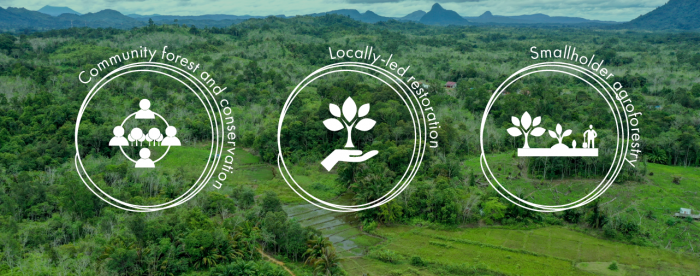News
Our stories ... ...

General - 11 November, 2024
Across tropical forest regions, unsustainable land use is driving biodiversity loss, accelerating climate change, and reducing local resilience. At Tropenbos International, we believe the solution lies in empowering local communities to manage their forest frontier areas sustainably, transforming them into thriving, resilient, and biodiverse landscapes.
The future of our planet is intricately tied to the state of its tropical forest areas. They harbour countless plant and animal species, regulate rainfall, and mitigate climate change by capturing carbon dioxide. Moreover, forests and trees are vital for sustaining agricultural productivity, providing food, and generating income for local communities. Yet, despite their globally acknowledged importance, tropical forests are disappearing rapidly. The 2024 Forest Declaration Assessment found that 6.37 million hectares of forest were lost in 2023, which is 45% above the target to meet international goals.
The greatest threats occur where forests meet expanding agricultural lands. Here, forests are being cleared for monoculture plantations, a practice that undermines biodiversity, affects the climate, and weakens the long-term resilience of communities, making them more vulnerable over time.
While many frontier areas are marked by conflicts among different land users and face rapid environmental decline, they also hold vast potential for positive change. However, when initiatives aimed at halting environmental degradation adopt a top-down approach, they run the risk of overlooking the needs of local people. Tropenbos International is working to change that by placing local communities at the center of sustainable forest management initiatives.
Local communities hold effective solutions for sustainable forest and tree management. They integrate trees into their fields, creating resilient agroforestry systems that boost productivity and biodiversity. They restore degraded lands, using diverse tree species to revive ecosystems and support livelihoods. And they manage forests sustainably, guided by their cultural, environmental, and economic values.
However, the wider adoption of such solutions is hindered by contextual barriers. Key challenges include restrictive land tenure policies, limited access to funding for smallholders, and value chains that don’t support sustainable forest products.
At Tropenbos International we aim to improve these conditions by fostering collaborative learning and informing decisionmakers, based on local experiences and scientific knowledge. This means we collaborate with communities and NGOs, as well as with governments and companies, to unlock the potential of local people to drive sustainable landscape transformation.
For a closer look at how local communities manage trees and forests, we invite you to watch the video: Voices from the landscape: Locally-owned solutions for thriving, resilient and biodiverse landscapes